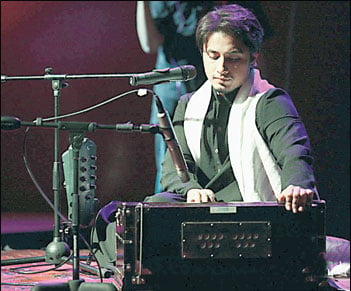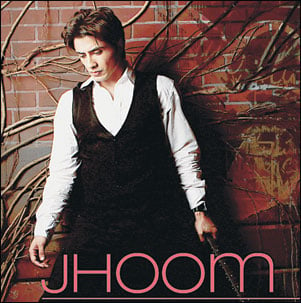 Jhoom is the most impeccable album in markets right now, the only one that is truly brilliant in its sound, concept and creation. At a time when music album releases are on the low and most records are serving disappointments, Ali Zafar has arrived with a bang. Jhoom is the most impeccable album in markets right now, the only one that is truly brilliant in its sound, concept and creation. At a time when music album releases are on the low and most records are serving disappointments, Ali Zafar has arrived with a bang.
He’s been in the news for a while now. 2010 was the year of Ali Zafar. He finally made his debut in Bollywood with Tere Bin Laden, a low-budget indie comedy that got noticed by critics, fans and celebrities alike. Karan Johar, Aamir Khan, Shah Rukh Khan, Salman Khan are some of the names who noticed Ali Zafar. Soon after, Ali signed another film, this time with Imran Khan and Katrina Kaif in tow. It’s safe to say that Ali’s film career is taking off in India.
But with this new career move came questions about Ali’s future in music. Will he continue? Can he? Now with the release of Jhoom, Ali’s third album, those questions can be laid to rest. After the playfulness of Huqa Pani and Masty, Ali has grown up and returned with his most mature, textured and beautiful album to date.
He’s played flamboyant music for years with hits such as ‘Sajania’, ‘Rangeen’ and the raging hit, ‘Channo’ under his belt. But the restlessness has finally subsided with Jhoom. Ali is more content, more at ease and that reflects in the musical direction this album has taken.
Inside the record
From the infectious ‘Tu Jaanay Na’ to the romantic air of ‘Jab Sey Dekha Tujh Ko’, the introspective ‘Jee Dhoondta Hai’, the soft gloom of ‘Koi Umeed’, the haunting undertones of ‘Jaan-e-man’, the sufic tunes work.
 For the most part, the album remains positive with some grey shades and that is delightful. The emotions bare all, love, loss, frustration; all tied together in a nifty package. For the most part, the album remains positive with some grey shades and that is delightful. The emotions bare all, love, loss, frustration; all tied together in a nifty package.
And yes it is also a pop music album, in most places. But not the kind of monotonous album that has a mind-numbing number of cheesy pop ballads placed at equal distance. But interesting, appealing music that will remain embedded in memories as a classic.
It is present on the jubilant ‘Tu Jaanay Na’ where Ali signs flirtatiously, “Tu Jaanay Na Meray Dil Ki Baatein/Hai Tu Kaha/Chandni Raatein/Sara Jag Jaan Hai/Tu Hee Na Maan Hai/Meray Dil Ki Zubaan”. He sings with such enjoyment and precision that he takes you inside the world of this story because it is written with such depth that imagination can almost paint a picture inside your head.
Move onto the title track, ‘Jhoom’ with its engaging ambience and fierce emotions, a ballad with a musical character that is subtle yet magnificent. With tablas, acoustic guitars and the chorus, “Dil Jhoom Jhoom Chaley/Jhoom Jhoom Chaley Sohniya”, it makes for one of the finest tunes on the album. It’s hard to say if it’s the best one though because there are quite a few songs with that potential. ‘Jhoom’ is instantly appealing and it grows on one with every listen.
Another is ‘Jee Dhoondta Hai’. Written by Mirza Ghalib, this tune is more introspective, addressing inner anxiety beautifully and with swirling guitars and crisp drums, it makes for one of the meatier tunes on this otherwise subdued record.
On a slightly similar note, one finds ‘Koi Umeed’, with an air of melancholia as Ali sings, “Koi Umeed Par Nahin/Koi Soorat Nazar Nahin Aati/Koi Umeed”. Lush instrumentation makes this such a daring song. Ali is mournful, connecting with the mood of the song. And it has to be said that the rhythm of this tune is quite hypnotic. Ali sings with conviction and the hopelessness and gloom hits the heart. It is rich in both textures and emotions.
What’s even more interesting is the way Ali sings each tune. It’s simultaneously uplifting and yet not overpowering. And his tone shifts appropriately to match each particular track. Most of the songs are highly textured and they defy convention and stand distinct from one another.
Coke Studio spillover
 For the last couple of years, Ali Zafar has been exploring eastern music and those learnings spilled onto Coke Studio where the focus is on our own heritage and sounds that hail from this soil. Not surprisingly, this was a perfect musical union. Whether it’s the hypnotic and trippy ‘Allah Hoo’ with Saeen Tufail Ahmed or Ustaad M Jumman’s folky ‘Yaar Dhadee’ or the tortuously beautiful ‘Dastaan-e-Ishq’ and the sonorous ‘Nahin Ray Nahin’, all of his Coke Studio numbers (from season II) make an appearance on Jhoom. Ali chose to re-work ‘Dastaan-e-Ishq’ within his studio but it remains patchy compared to the original Coke Studio mix. The ‘dhol’ mix however is interesting. It’s got an interesting beat which makes for interesting listen. For the last couple of years, Ali Zafar has been exploring eastern music and those learnings spilled onto Coke Studio where the focus is on our own heritage and sounds that hail from this soil. Not surprisingly, this was a perfect musical union. Whether it’s the hypnotic and trippy ‘Allah Hoo’ with Saeen Tufail Ahmed or Ustaad M Jumman’s folky ‘Yaar Dhadee’ or the tortuously beautiful ‘Dastaan-e-Ishq’ and the sonorous ‘Nahin Ray Nahin’, all of his Coke Studio numbers (from season II) make an appearance on Jhoom. Ali chose to re-work ‘Dastaan-e-Ishq’ within his studio but it remains patchy compared to the original Coke Studio mix. The ‘dhol’ mix however is interesting. It’s got an interesting beat which makes for interesting listen.
Come to the songwriting, Ali asks questions but with a punch. One example is ‘Nahin Ray Nahin’ where he says, “Socha Kya Kabhi Tunay Ye /Aaye Tum Kahan Se Ho/Jayoga Kaha Tum?” and more daringly he says further, “Nahin Ray Nahin”. It sounds simple enough but with soft piano, and subtle flute, it’s a shining tune. Ali has simply put in the Coke Studio version of this tune instead of re-working it and it all works.
The verdict
Remember, the expectations were as high as it can be. Huqa Pani was a stunning musical debut with critical and commercial acclaim. Masty consolidated Ali Zafar’s name power in music for good. And it has been four years since Ali’s last musical release, Masty (2006). Between this time, other acts like Atif Aslam have come and conquered our imagination. There are other equally talented acts around such as Overload, Jal, Roxen, Mekaal Hasan Band that have carved solid following for themselves. Then there are artists like Strings who continue to charm audiences.
 Add all this to the fact that Masty was a tough act to follow. While patchy in some places, overall the album made its mark with anyone and everyone. Who can forget the energy of ‘Masty’ or the playfulness of ‘Dekha’? Add all this to the fact that Masty was a tough act to follow. While patchy in some places, overall the album made its mark with anyone and everyone. Who can forget the energy of ‘Masty’ or the playfulness of ‘Dekha’?
But Jhoom not only matches Masty, it actually surpasses it with grace. It proves something that is rare these days and that is artistic growth.
There are many reasons why Jhoom stands out. For one thing, Ali Zafar has taken on the role of mixing, recording and engineering the album himself. But despite the added responsibility, Ali delivers. It’s crisp, it’s sharp and it’s solid. There may not be a ‘Sajania’ on this record but then again, after two albums, Ali Zafar made the smart choice by diversifying. Unlike his previous records, this one is eastern-inspired but it never falters. On the whole, Jhoom is a step up from Masty. Forget the loud effects of Masty. Jhoom is about the creation of textured tunes, eastern melodies and fierce emotions but at the same time, an album that isn’t redundant or monotonous. Can Ali Zafar do no wrong? No, not likely, not after the magic that Jhoom has created. Tasteful and truly inspired, it just doesn’t get better than this for the wonderboy of pop. |

